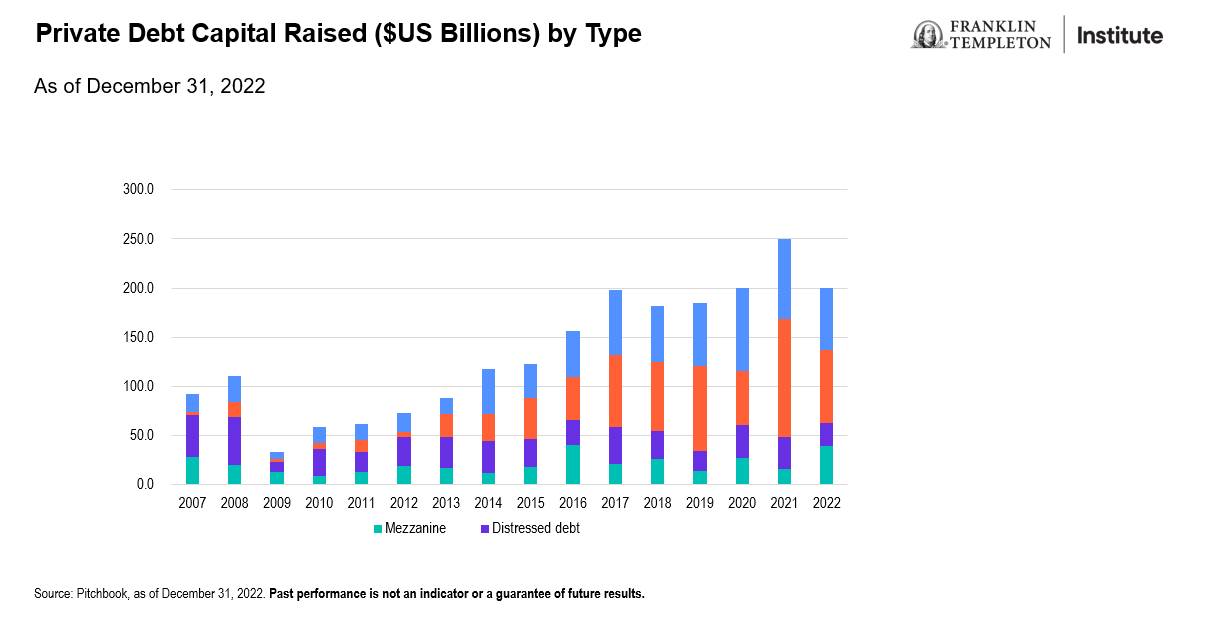After the 2008 global financial crisis (GFC), where banks retrenched from lending to small-middle market opportunities, private credit managers stepped in to fill the void, leading to the extraordinary growth of the asset class. As the data below illustrates, private credit (debt) grew dramatically from 2009 through 2022, with diversified growth across direct lending, mezzanine and distressed.
Private credit has been a growing allocation for institutions and family offices due to its attractive risk-adjusted returns, high income potential and inflation hedging.1 And, recently through product innovation, private credit is now available to a broader group of investors, at lower minimums, and with more flexible features. It is estimated that most private credit is floating rate, and the asset class delivered positive returns in 2022, as the coupon rate adjusted as rates rose throughout the year.2
We see parallels to the post-GFC market environment, where private credit managers stepped in to fill the void traditional banks had left. In a post-Silicon Valley Bank market environment, private credit managers will have the upper hand in negotiating favorable pricing, terms and covenants. During the last several years, with growing competition for deal flow, there was an increasing amount of “covenant-lite” deals. Now, private credit managers have the leverage to negotiate favorable terms and covenants.
Looking ahead, we anticipate seeing a larger dispersion of return between experienced managers who can navigate the challenging environment, and those whose only experience is investing capital during an easy money environment, with low default rates. Even if default rates rise, we believe seasoned managers, with experienced workout teams, should be able to renegotiate terms.
In today’s market environment, private credit managers can be more selective in deploying capital. Like the post-GFC environment, the pendulum has switched to favor lenders in these tight credit conditions. Experienced private credit managers should be able to effectively navigate these challenging conditions in an effort to generate favorable outcomes.
WHAT ARE THE RISKS?
All investments involve risks, including the possible loss of principal. The value of investments can go down as well as up, and investors may not get back the full amount invested. Stock prices fluctuate, sometimes rapidly and dramatically, due to factors affecting individual companies, particular industries or sectors, or general market conditions. Bond prices generally move in the opposite direction of interest rates. Thus, as prices of bonds in an investment portfolio adjust to a rise in interest rates, the value of the portfolio may decline.
Investing in private companies involves a number of significant risks, including that they: may have limited financial resources and may be unable to meet their obligations under their debt securities, which may be accompanied by a deterioration in the value of any collateral and a reduction in the likelihood of realizing any guarantees that may have obtained in connection with the investment; have shorter operating histories, narrower product lines and smaller market shares than larger businesses, which tend to render them more vulnerable to competitors’ actions and changing market conditions, as well as general economic downturns; are more likely to depend on the management talents and efforts of a small group of persons; therefore, the death, disability, resignation or termination of one or more of these persons could have a material adverse impact on the portfolio company and, in turn, on the investment; generally have less predictable operating results, may from time to time be parties to litigation, may be engaged in rapidly changing businesses with products subject to a substantial risk of obsolescence, and may require substantial additional capital to support their operations, finance expansion or maintain their competitive position.
IMPORTANT LEGAL INFORMATION
This material is intended to be of general interest only and should not be construed as individual investment advice or a recommendation or solicitation to buy, sell or hold any security or to adopt any investment strategy. It does not constitute legal or tax advice. This material may not be reproduced, distributed or published without prior written permission from Franklin Templeton.
The views expressed are those of the investment manager and the comments, opinions and analyses are rendered as at publication date and may change without notice. The underlying assumptions and these views are subject to change based on market and other conditions and may differ from other portfolio managers or of the firm as a whole. The information provided in this material is not intended as a complete analysis of every material fact regarding any country, region or market. There is no assurance that any prediction, projection or forecast on the economy, stock market, bond market or the economic trends of the markets will be realised. The value of investments and the income from them can go down as well as up and you may not get back the full amount that you invested. Past performance is not necessarily indicative nor a guarantee of future performance. All investments involve risks, including possible loss of principal.
Any research and analysis contained in this material has been procured by Franklin Templeton for its own purposes and may be acted upon in that connection and, as such, is provided to you incidentally. Data from third party sources may have been used in the preparation of this material and Franklin Templeton (“FT”) has not independently verified, validated or audited such data. Although information has been obtained from sources that Franklin Templeton believes to be reliable, no guarantee can be given as to its accuracy and such information may be incomplete or condensed and may be subject to change at any time without notice. The mention of any individual securities should neither constitute nor be construed as a recommendation to purchase, hold or sell any securities, and the information provided regarding such individual securities (if any) is not a sufficient basis upon which to make an investment decision. FT accepts no liability whatsoever for any loss arising from use of this information and reliance upon the comments, opinions and analyses in the material is at the sole discretion of the user.
Products, services and information may not be available in all jurisdictions and are offered outside the U.S. by other FT affiliates and/or their distributors as local laws and regulation permits. Please consult your own financial professional or Franklin Templeton institutional contact for further information on availability of products and services in your jurisdiction.
_____________
1. Sources: CAIA Association and Preqin. 2022 UBS Global Family Office Report. Prepared by FT Capital Markets Insights Group. Private Credit represented by Cliffwater Direct Lending index as of September 30,2022, back filled with Credit Suisse Leveraged Loan Index prior to January 2005.
2. Source: Pitchbook Private Debt Report, 2022.

 English
English 简体中文
简体中文
